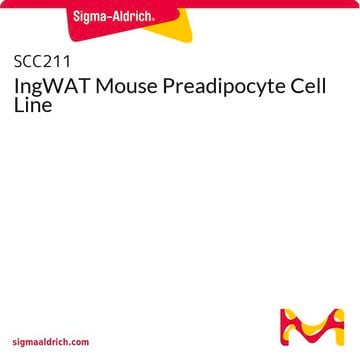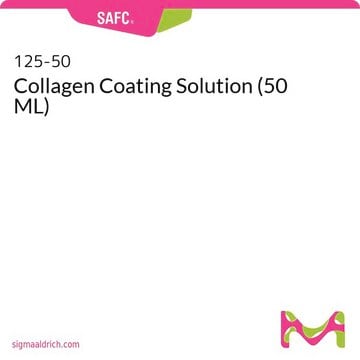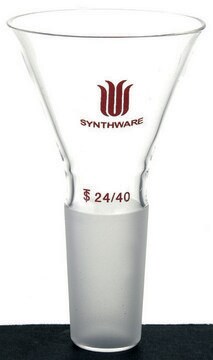308-05A
Human Internal Thoracic Artery Endothelial Cells: HITAEC, adult
Autenticatiper visualizzare i prezzi riservati alla tua organizzazione & contrattuali
About This Item
Codice UNSPSC:
41106514
NACRES:
NA.81
Prodotti consigliati
Origine biologica
human intrathoratic artery (normal)
Livello qualitativo
Confezionamento
pkg of 500,000 cells
Produttore/marchio commerciale
Cell Applications, Inc
Modalità di accrescimento
Adherent
Cariotipo
2n = 46
Morfologia
Endothelial
tecniche
cell culture | mammalian: suitable
Malattie correlate
diabetes; cardiovascular diseases
Condizioni di spedizione
dry ice
Temperatura di conservazione
−196°C
Descrizione generale
Lot specific orders are not able to be placed through the web. Contact your local sales rep for more details.
HITAEC has been used to investigate oral pathogens travel through the body by infecting dendritic cells and inducing them to migrate through endothelial layers by causing upregulation of CXCR4 (Miles, 2014). To identify genes that make Human Internal Thoracic Arteries resistant to atherosclerosis, HITAEC and HCAEC (derived from the athero-prone human coronary arteries) were subjected to microarray analysis (Archaki, 2012). Twenty-nine genes were found to be expressed differently between HITAEC and HCAEC; one of them (TES) was shown to be downregulated in patients with coronary artery disease, resulting in increased monocyte adhesion, endothelial cell motility and transendothelial migration of monocytes.
HITAEC has been used to investigate oral pathogens travel through the body by infecting dendritic cells and inducing them to migrate through endothelial layers by causing upregulation of CXCR4 (Miles, 2014). To identify genes that make Human Internal Thoracic Arteries resistant to atherosclerosis, HITAEC and HCAEC (derived from the athero-prone human coronary arteries) were subjected to microarray analysis (Archaki, 2012). Twenty-nine genes were found to be expressed differently between HITAEC and HCAEC; one of them (TES) was shown to be downregulated in patients with coronary artery disease, resulting in increased monocyte adhesion, endothelial cell motility and transendothelial migration of monocytes.
Origine della linea cellulare
Artery
Applicazioni
coronary artery bypass grafting, myocardial revascularization, endothelial cell motility, transendothelial migration, gene expression, contractile responses, receptor stimulation, cell relaxation, supply of oxygenated blood to chest wall and breasts,
Componenti
Basal Medium containing 10% FBS & 10% DMSO
Nota sulla preparazione
- 2nd passage, >500,000 cells in Basal Medium containing 10% FBS & 10% DMSO
- Can be cultured at least 10 doublings
Mantenimento delle subcolture
Please refer to the HITAEC Culture Protocol.
Esclusione di responsabilità
RESEARCH USE ONLY. This product is regulated in France when intended to be used for scientific purposes, including for import and export activities (Article L 1211-1 paragraph 2 of the Public Health Code). The purchaser (i.e. enduser) is required to obtain an import authorization from the France Ministry of Research referred in the Article L1245-5-1 II. of Public Health Code. By ordering this product, you are confirming that you have obtained the proper import authorization.
Codice della classe di stoccaggio
11 - Combustible Solids
Classe di pericolosità dell'acqua (WGK)
WGK 3
Punto d’infiammabilità (°F)
Not applicable
Punto d’infiammabilità (°C)
Not applicable
Certificati d'analisi (COA)
Cerca il Certificati d'analisi (COA) digitando il numero di lotto/batch corrispondente. I numeri di lotto o di batch sono stampati sull'etichetta dei prodotti dopo la parola ‘Lotto’ o ‘Batch’.
Possiedi già questo prodotto?
I documenti relativi ai prodotti acquistati recentemente sono disponibili nell’Archivio dei documenti.
Il team dei nostri ricercatori vanta grande esperienza in tutte le aree della ricerca quali Life Science, scienza dei materiali, sintesi chimica, cromatografia, discipline analitiche, ecc..
Contatta l'Assistenza Tecnica.







